英汉翻译评析(附参考译文)
历年翻译真题原文及参考译文(1)
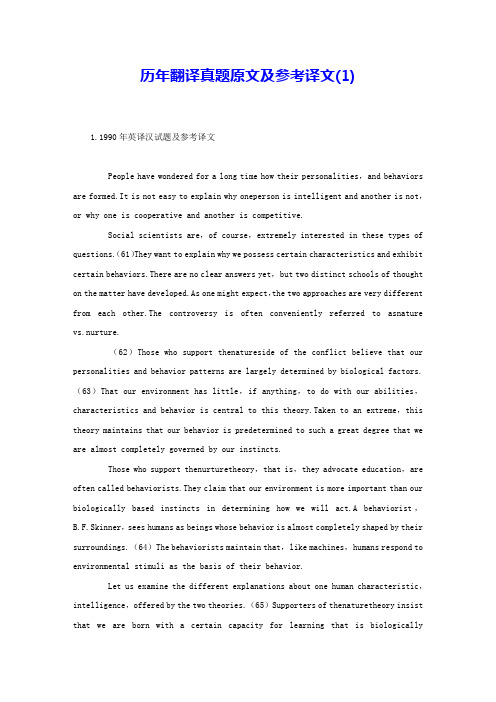
历年翻译真题原文及参考译文(1)1.1990年英译汉试题及参考译文People have wondered for a long time how their personalities,and behaviors are formed.It is not easy to explain why oneperson is intelligent and another is not,or why one is cooperative and another is competitive.Social scientists are,of course,extremely interested in these types of questions.(61)They want to explain why we possess certain characteristics and exhibit certain behaviors.There are no clear answers yet,but two distinct schools of thought on the matter have developed.As one might expect,the two approaches are very different from each other.The controversy is often conveniently referred to asnature vs.nurture.(62)Those who support thenatureside of the conflict believe that our personalities and behavior patterns are largely determined by biological factors.(63)That our environment has little,if anything,to do with our abilities,characteristics and behavior is central to this theory.Taken to an extreme,this theory maintains that our behavior is predetermined to such a great degree that we are almost completely governed by our instincts.Those who support thenurturetheory,that is,they advocate education,are often called behaviorists.They claim that our environment is more important than our biologically based instincts in determining how we will act.A behaviorist,B.F.Skinner,sees humans as beings whose behavior is almost completely shaped by their surroundings.(64)The behaviorists maintain that,like machines,humans respond to environmental stimuli as the basis of their behavior.Let us examine the different explanations about one human characteristic,intelligence,offered by the two theories.(65)Supporters of thenaturetheory insist that we are born with a certain capacity for learning that is biologicallydetermined.Needless to say,they don't believe that factors in the environment have much influence on what is basically a predetermined characteristic.On the other hand,behaviorists argue that our intelligence levels are the product of our experiences.(66)Behaviorists suggest that the child who is raised in an environment where there are many stimuli whichdevelop his or her capacity for appropriate responses will experience greater intellectual development.The social and political implications of these two theories are profound.(67)In the United States,blacks often score below whites on standardized intelligence tests.This leads somenatureproponents to conclude that blacks are biologically inferior to whites.(68)Behaviorists,in contrast,say that differences in scores are due to the fact that blacks are often deprived of many of the educational and other environmental advantages that whites enjoy.Most people think neither of these theories can yet fully explain human behavior.1990年英译汉试题参考译文长期以来人们完全不知道他们的性格特征和行为模式是怎样形成的。
第4届韩素音青年翻译比赛英译汉原文及参考译文
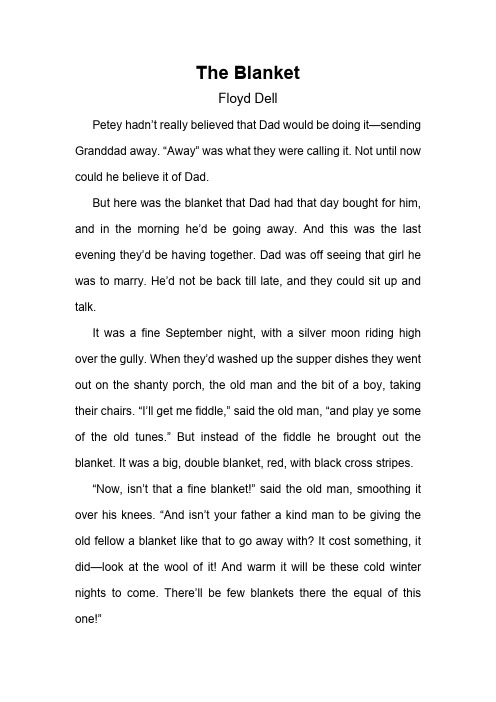
The BlanketFloyd DellPetey hadn’t really believed that Dad would be doing it—sending Granddad away. “Away” was what they were calling it. Not until now could he believe it of Dad.But here was the blanket that Dad had that day bought for him, and in the morning he’d be going away. And this was the last evening they’d be having together. Dad was off seeing that girl he was to marry. He’d not be back till late, and they could sit up and talk.It was a fine September night, with a silver moon riding high over the gully. When they’d washed up the supper dishes they went out on the shanty porch, the old man and the bit of a boy, taking their chairs. “I’ll get me fiddle,” said the old man, “and play ye some of the old tunes.” But instead of the fiddle he brought out the blanket. It was a big, double blanket, red, with black cross stripes.“Now, isn’t that a fine blanket!” said the old man, smoothing it over his knees. “And isn’t your father a kind man to be giving the old fellow a blanket like that to go away with? It cost something, it did—look at the wool of it! And warm it will be these cold winter nights to come. There’ll be few blankets there the equal of this one!”It was like Granddad to be saying that. He was trying to make it easier. He’d pretended all along it was he that wanting to go away to the great brick building—the government place, where he’d be with so many other old fellows having the best of everything.... But Petey hadn’t believed Dad would really do it, until this night when he brought home the blanket.“Oh, yes, it’s a fine blanket,” said Petey, and got up and went into the shanty. He wasn’t the kind to cry, and, besides, he was too old for that, being eleven. He’d just come in to fetch Granddad’s fiddle.The blanket slid to the floor as the old man took the fiddle and stood up. It was the last night they’d be having together. There wasn’t any need to say, “Play all the old tunes.” Granddad tuned up for a minute, and then said, “This is one you’ll like to remember.”The silver moon was high overhead, and there was a gentle breeze playing down the gully. He’d never be hearing Granddad play like this again. It was as well Dad was moving into that new house, away from here. He’d not want, Petey wouldn’t, to sit here on the old porch of fine evenings, with Granddad gone.The tune changed. “Here’s something gayer.” Petey sat and stared out over the gully. Dad would marry that girl. Yes, that girl who’d kissed him and slobbered over him, saying she’d try to be agood mother to him, and all.... His chair creaked as he involuntarily gave his body a painful twist.The tune stopped suddenly, and Granddad said: “It’s a poor tune, except to be dancing to.” And then: “It’s a fine girl your father’s going to marry. He’ll be feeling young again, with a pretty wife like that. And what would an old fellow like me be doing around their house, getting in the way, an old nuisance, what with my talk of aches and pains! And then there’ll be babies coming, and I’d not want to be there to hear them crying at all hours. It’s best that I take myself off, like I’m doing. One more tune or two, and then we’ll be going to bed to get some sleep against the morning, when I’ll pack up my fine blanket and take my leave. Listen to this, will you? It’s a bit sad, but a fine tune for a night like this.”They didn’t hear the two people coming down the gully path, Dad and the pretty girl with the hard, bright face like a china doll’s. but they heard her laugh, right by the porch, and the tune stopped on a wrong, high, startled note. Dad didn’t say anything, but the girl came forward and spoke to Granddad prettily: “I’ll not be seeing you leave in the morning, so I came over to say good-by.”“It’s kind of you,” said Granddad, with his eyes cast down; and then, seeing the blanket at his feet, he stopped to pick it up. “Andwill you look at this,” he said in embarrassment, “the fine blanket my son has given me to go away with!”“Yes,” she said, “it’s a fine blanket.” She felt of the wool, and repeated in surprise, “A fine blanket—I’ll say it is!” She turned to Dad, and said to him coldly, “it cost something, that.”He cleared his throat, and said defensively, “I wanted him to have the best...”The girl stood there, still intent on the blanket. “It’s double, too,” she said reproachfully to Dad.“Yes,” said Granddad, “it’s double—a fine blanket for an old fellow to be going away with.”The boy went abruptly into the shanty. He was looking for something. He could hear that girl reproaching Dad, and Dad becoming angry in his slow way. And now she was suddenly going away in a huff.... As Petey came out, she turned and called back, “All the same, he doesn’t need a double blanket!” And she ran up the gully path.Dad was looking after her uncertainly.“Oh, she’s right,” said the boy coldly. “Here, Dad”—and he held out a pair of scissors. “Cut the blanket in two.”Both of them stared at the boy, startled. “Cut it in two, I tell you, Dad!” he cried out. “And keep the other half!”“That’s not a bad idea,” said Granddad gently. “I don’t need so much of a blanket.”“Yes,” said the boy harshly, “a single blanket is enough for an old man when he’s sent away. We’ll save the other half, Dad; it will come in handy later.”“Now, what do you mean by that?” asked Dad.“I mean,” said the boy slowly,” that I’ll give it to you, Dad—when you’re old and I’m sending you—away.”There was a silence, and then Dad went over to Granddad and stood before him, not speaking. But Granddad understood, for he put out a hand and laid it on Dad’s shoulder. Petey was watching them. And he heard Granddad whisper, “It’s all right, son—I knew you didn’t mean it....” And then Petey cried.But it didn’t matter—because they were all three crying together.译文:一床双人毛毯(美)弗罗伊德•戴尔晴朗的九月的夜晚,银色的月光洒落在溪谷上。
《新英汉翻译教程》第五章词义的处理_参考译文
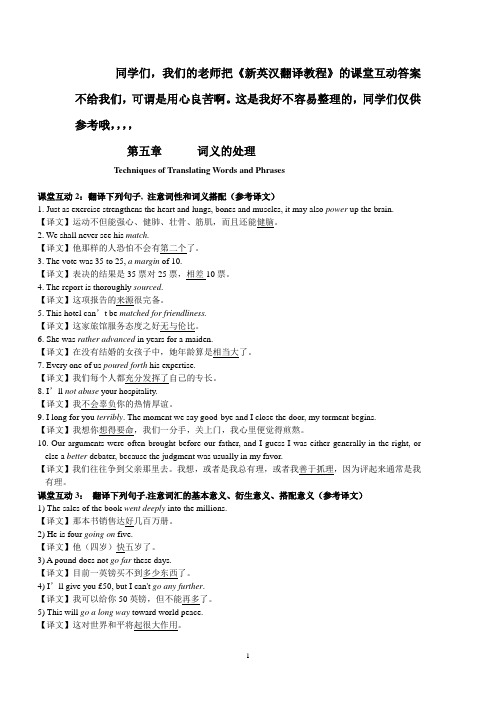
同学们,我们的老师把《新英汉翻译教程》的课堂互动答案不给我们,可谓是用心良苦啊。
这是我好不容易整理的,同学们仅供参考哦,,,,第五章词义的处理T echniques of T ranslating Words and Phrases课堂互动2:翻译下列句子, 注意词性和词义搭配(参考译文)1. Just as exercise strengthens the heart and lungs, bones and muscles, it may also power up the brain.【译文】运动不但能强心、健肺、壮骨、筋肌,而且还能健脑。
2. We shall never see his match.【译文】他那样的人恐怕不会有第二个了。
3. The vote was 35 to 25, a margin of 10.【译文】表决的结果是35票对25票,相差10票。
4. The report is thoroughly sourced.【译文】这项报告的来源很完备。
5. This hotel can’t be matched for friendliness.【译文】这家旅馆服务态度之好无与伦比。
6. She was rather advanced in years for a maiden.【译文】在没有结婚的女孩子中,她年龄算是相当大了。
7. Every one of us poured forth his expertise.【译文】我们每个人都充分发挥了自己的专长。
8. I’ll not abuse your hospitality.【译文】我不会辜负你的热情厚谊。
9. I long for you terribly. The moment we say good-bye and I close the door, my torment begins.【译文】我想你想得要命,我们一分手,关上门,我心里便觉得煎熬。
英译汉翻译赏析176段(1)
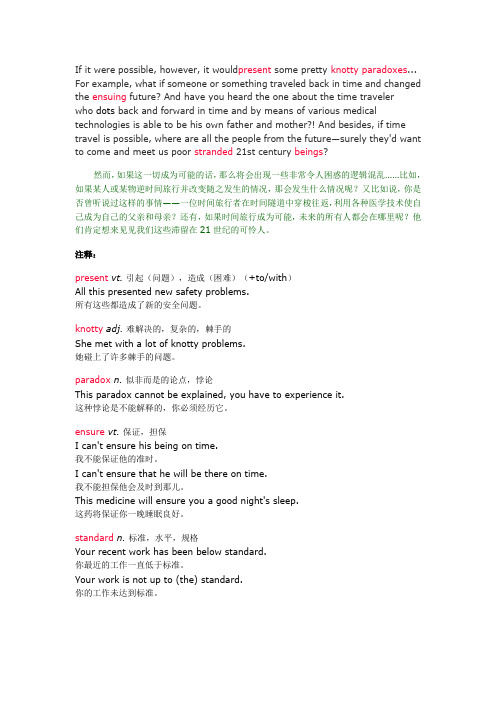
If it were possible, however, it would present some pretty knotty paradoxes... For example, what if someone or something traveled back in time and changed the ensuing future? And have you heard the one about the time travelerwho dots back and forward in time and by means of various medical technologies is able to be his own father and mother?! And besides, if time travel is possible, where are all the people from the future—surely they'd want to come and meet us poor stranded 21st century beings?然而,如果这一切成为可能的话,那么将会出现一些非常令人困惑的逻辑混乱……比如,如果某人或某物逆时间旅行并改变随之发生的情况,那会发生什么情况呢?又比如说,你是否曾听说过这样的事情——一位时间旅行者在时间隧道中穿梭往返,利用各种医学技术使自己成为自己的父亲和母亲?还有,如果时间旅行成为可能,未来的所有人都会在哪里呢?他们肯定想来见见我们这些滞留在21世纪的可怜人。
注释:present vt.引起(问题),造成(困难)(+to/with)All this presented new safety problems.所有这些都造成了新的安全问题。
knotty adj.难解决的,复杂的,棘手的She met with a lot of knotty problems.她碰上了许多棘手的问题。
2021年考研英语翻译真题及详细解析(英译汉)
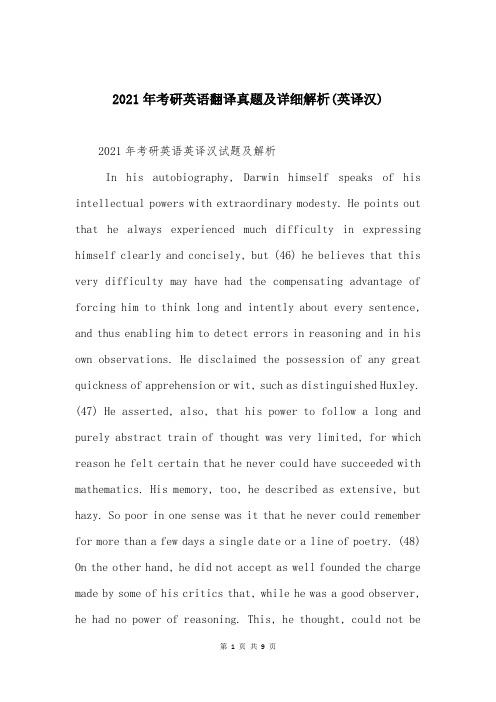
2021年考研英语翻译真题及详细解析(英译汉)2021年考研英语英译汉试题及解析In his autobiography, Darwin himself speaks of his intellectual powers with extraordinary modesty. He points out that he always experienced much difficulty in expressing himself clearly and concisely, but (46) he believes that this very difficulty may have had the compensating advantage of forcing him to think long and intently about every sentence, and thus enabling him to detect errors in reasoning and in his own observations. He disclaimed the possession of any great quickness of apprehension or wit, such as distinguished Huxley.(47) He asserted, also, that his power to follow a long and purely abstract train of thought was very limited, for which reason he felt certain that he never could have succeeded with mathematics. His memory, too, he described as extensive, but hazy. So poor in one sense was it that he never could remember for more than a few days a single date or a line of poetry. (48) On the other hand, he did not accept as well founded the charge made by some of his critics that, while he was a good observer, he had no power of reasoning. This, he thought, could not betrue, because the “Origin of Species” is one long argument from the beginning to the end, and has convinced many able men. No one, he submits, could have written it without possessing some power of reasoning. He was willing to assert that “I have a fair share of invention, and of common sense or judgment, such as every fairly successful lawyer or doctor must have, but not, I believe, in any higher degree.” (49) He adds humbly that perhaps he was “superior to the common run of men in noticing things which easily escape attention, and in observing them carefully.”Writing in the last year of his life, he expressed the opinion that in two or three respects his mind had changed during the preceding twenty or thirty years. Up to the age of thirty or beyond it poetry of many kinds gave him great pleasure. Formerly, too, pictures had given him considerable, and music very great, delight. In 1881, however, he said: “Now for many years I cannot endure to read a line of poetry. I have also almost lost my taste for pictures or music.” (50) Darwin was convinced that the loss of these tastes was not only a loss of happiness, but might possibly be injurious to the intellect, and more probably to the moral character.真题解析46. He believes / that (this very )difficulty may have had the compensating advantage (of forcing him to think long and intently about every sentence, // and thus enabling him to detect errors in reasoning and in his own observations.) 句子结构分析(1)本句是一个主从复合句,含有一个that引导的宾语从句;其主干是he believes that (difficulty may have had the advantage).(2)宾语从句“that this very…his own observations”含有of引导的两个后置定语“of forcing him to…his own observations”;由于是分词短语作定语,且太长,翻译时要找到与主句的逻辑关系,翻译成非定语成分。
英汉译作比较与评判
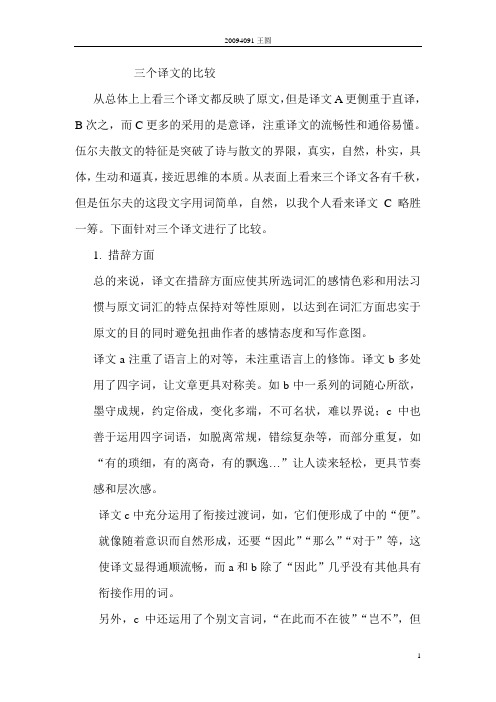
三个译文的比较从总体上上看三个译文都反映了原文,但是译文A更侧重于直译,B次之,而C更多的采用的是意译,注重译文的流畅性和通俗易懂。
伍尔夫散文的特征是突破了诗与散文的界限,真实,自然,朴实,具体,生动和逼真,接近思维的本质。
从表面上看来三个译文各有千秋,但是伍尔夫的这段文字用词简单,自然,以我个人看来译文C略胜一筹。
下面针对三个译文进行了比较。
1.措辞方面总的来说,译文在措辞方面应使其所选词汇的感情色彩和用法习惯与原文词汇的特点保持对等性原则,以达到在词汇方面忠实于原文的目的同时避免扭曲作者的感情态度和写作意图。
译文a注重了语言上的对等,未注重语言上的修饰。
译文b多处用了四字词,让文章更具对称美。
如b中一系列的词随心所欲,墨守成规,约定俗成,变化多端,不可名状,难以界说;c中也善于运用四字词语,如脱离常规,错综复杂等,而部分重复,如“有的琐细,有的离奇,有的飘逸…”让人读来轻松,更具节奏感和层次感。
译文c中充分运用了衔接过渡词,如,它们便形成了中的“便”。
就像随着意识而自然形成,还要“因此”“那么”“对于”等,这使译文显得通顺流畅,而a和b除了“因此”几乎没有其他具有衔接作用的词。
另外,c中还运用了个别文言词,“在此而不在彼”“岂不”,但是读者能够轻易的领会到其中的意思,这让译文的精简也成为了一种美感。
2.句类转换第一句examine for a moment an ordinary mind on an ordinary day, 译文a翻译的很生硬,而译文吧b和c加上了一个感叹词吧让人更易接受,但是b中普普通通看起来有些矫揉造作,刻意的去修饰反而有些啰嗦。
Engraved with the sharpness of steel,译文b翻译为用锋利钢刀铭刻在心头的印象,a则简洁异化成刻骨铭心,c则巧妙的翻译成则像利刃刻下似的那样明晰,这样翻译既符合汉语的语言习惯,又不失原文的意思。
译文c 中那句“不必非有……不可”(there would be no plot...),后面的一句“也不必非要按照……”(and perhaps not a single button sewn on …)与译文a,b中“那就不会有……”语气存在着微妙的差异,说明生活是可以存在变化,并非一成不变的,让人读来眼前一亮。
第三章英汉语言对比分析·句子资料.
译文:从早到晚,都有妻子、护士、秘书这样的女 帮手服侍他们。
例2:I was truly dumbfounded by this deep fury that possessed her whenever she looked at me.
sun, so each had a private little sun for her soul to bask in… 译文:她们大家,不仅个个身上都给太阳晒得暖烘烘的,而且
人人心里都有一个小太阳,温暖着各自的心灵。 例3:She was caught in the downpour. 译文:她让大雨淋着了。
第四节 否定句的译法
例2:At no time and under no circumstances will China be the first to use nuclear weapons.
译文:中国在任何时间和任何情况下都不 会首先使用核武器。
5.1 定语从句的翻译
5.1.2 后置译法
的意见。 例2: In a personal sense, I think of my eldest son, whose birthday is
today. 译文:就个人来讲,我想到我的大儿子,因为今天是他的生日。
5.1 定语从句的翻译
5.1.4 译成状语
含有表示目的意思的定语从句。如: 例1:We have to oil the moving parts of the machine, the friction of
商务英语翻译及点评
商务英语翻译及点评商务英语翻译及点评汇总商务英语翻译需要阅读更多的相关翻译,以提高词汇量及语感。
下面是yjbys网为大家提供的关于商务英语翻译及点评,希望对大家的BEC翻译有帮助!一、【原文】“天山”牌羊绒衫具有色泽鲜艳,手感柔滑,穿着舒适,轻便保暖等特点。
由于该产品质地优良,做工精细,花型、款式新颖,尺码齐全,受到国外消费者的热烈欢迎。
【译文】"Tianshan" brand cashmere sweaters,characterized by their bright colors,soft feel and light weight,are warm and comfortable to wear.Thanks to/Because of their fine quality,excellent workmanship,novel designs and styles and complete range of sizes,they have gained popularity with consumers abroad.【点评】汉语中的四字短语读起来铿锵有力,节奏优美,他们的使用是汉语的一大特点,但汉语中的'四字短语会呈现不同的结构,如主谓结构、动宾结构、偏正结构等。
本例中的“色彩鲜艳”、“手感柔滑”、“穿着舒适”便是主谓结构,但英译文将它们分别译成了“bright colors”、“soft feel”和“light weight”,这种结构属于汉语中的偏正结构,即形容词修饰中心名词,这样翻译是为了英语的行文需要而做的改变,因为这里英译文“characterized”之后需要接名词短语。
二、【原文】企业要重视职员的能力、创造力、智慧潜力的充分发挥,为他们创造公平竞争的工作环境,搞好企业人员的培训,激发企业员工的积极性,让每个人都能人尽其材。
【译文】Business should give prominence to the full use of employees' capabilities,creativity and wisdom potential,trying tocreate a working environment with fair competition,doing well in the training of employees,arousing the empolyees' enthusiasm about work and making the best possible use of every employee.【点评】“重视”是一个常用的词语,其英语对应表达可以是highly regard,attach importance to,think much of等,但这些表达都无法同“充分发挥”的英文对应语the full play搭配,因此需要另外寻找一个表达形式以便和the full play搭配起来。
2021年考研英语翻译真题及详细解析(英译汉)_1
2021年考研英语翻译真题及详细解析(英译汉)2021年考研英语英译汉试题及解析There is a marked difference between the education which every one gets from living with others, and the deliberate educating of the young. In the former case the education is incidental; it is natural and important, but it is not the express reason of the association.(46)It may be said that the measure of the worth of any social institution is its effect in enlarging and improving experience; but this effect is not a part of its original motive. Religious associations began, for example, in the desire to secure the favor of overruling powers and to ward off evil influences; family life in the desire to gratify appetites and secure family perpetuity; systematic labor, for the most part, because of enslavement to others, etc. (47)Only gradually was the by-product of the institution noted, and only more gradually still was this effect considered as a directive factor in the conduct of the institution.Even today, in our industrial life, apart from certain values of industriousness and thrift, the intellectual and emotional reaction of the forms of human association underwhich the world’s work is carried on receives little attention as compared with physical output.But in dealing with the young, the fact of association itself as an immediate human fact, gains in importance.(48)While it is easy to ignore in our contact with them the effect of our acts upon their disposition, it is not so easy as in dealing with adults. The need of training is too evident; the pressure to accomplish a change in their attitude and habits is too urgent to leave these consequences wholly out of account.(49)Since our chief business with them is to enable them to share in a common life we cannot help considering whether or no we are forming the powers which will secure this ability.If humanity has made some headway in realizing that the ultimate value of every institution is its distinctively human effect we may well believe that this lesson has been learned largely through dealings with the young.(50)We are thus led to distinguish, within the broad educational process which we have been so far considering, a more formal kind of education—that of direct tuition or schooling.In undeveloped social groups, we find very little formal teaching and training. These groups mainly rely for instilling needed dispositions into the young upon the samesort of association which keeps the adults loyal to their group.真题解析46. It may be said //that the measure (of the worth of any social institution) is its effect (in enlarging and improving experience); / but this effect is not a part of its original motive.句子结构分析(1)该句是由but连接的并列复合句,句子的主干是it may be said…but this effect is not a part.(2)that引导的是宾语从句,其句子的主干是the measure is its effect.(3)本句是并列句,与汉语语序基本一致,可以采取顺译法。
译文评析报告示范
应用英语学院唐耀彩 2011年9月6日
概览
原文分析 精彩译文评析 实用词汇的翻译 对译文的总体评价
原文分析
这篇双语读物选自《英语世界》2011年第8期。 英语原文是法新社2009年11月14日的一篇新 闻报道,全文779个单词。《英语世界》将该 篇报到压缩至348个单词。 这篇报道分析经济萎靡背景下网上超市兴旺的 原因(节省开支、手机用户增多),并指出兴 旺背后可能存在的隐患(消费者的信心)。文 章难度中等,生词或难句较少,内容易懂。
精彩译文评析:长句的处理(2)
The report found that the financial crisis had breathed new life into electronic commerce, with sales rising in Europe, the United States and China at a time when the store-based retail sector struggles as consumers’ disposable income shrivels. 该报告发现,由于消费者的可支配收入萎缩, 以商店为基础的零售界疲于挣扎,这时,金融 危机却给电子商务注入了新的生命,在欧洲、 美国和中国,销售额不断上升。
实用词汇的翻译
disposable income 可支配收入 physical stores 实体店 mobile phone subscribers 手机用户 economies 经济体
对总体评价
这是一篇高质量的译文,尽管个别地方有推敲 的余地。译者出色地翻译了这篇新闻报道。标 题的翻译就很精彩,Internet Global Supermarket Booms in Bad Times《全球网上 超市逆流而上》。原文表达明白晓畅,译文表 达体现出译者的语言功力。译文通篇做到了忠 实准确、通顺流畅、风格得体。值得推敲的例 子如“ the country’s leading e-commerce company ”译为“中国电子商务龙头公司”, “It noted"译为“它指出”。
- 1、下载文档前请自行甄别文档内容的完整性,平台不提供额外的编辑、内容补充、找答案等附加服务。
- 2、"仅部分预览"的文档,不可在线预览部分如存在完整性等问题,可反馈申请退款(可完整预览的文档不适用该条件!)。
- 3、如文档侵犯您的权益,请联系客服反馈,我们会尽快为您处理(人工客服工作时间:9:00-18:30)。
英汉翻译评析(附参考译文) 1 / 7 英汉翻译讲解(1) I. 英汉之间的差别: “对于中国学生最有用的帮助是让他认识英语和汉语的差别。”------吕叔湘 国内学者的共识是:汉语是综合性的,描写性的,而英语是分析性的,逻辑性的。在语言学上最重要的区别在于形合和意合的对比(contrast between hypotaxis and parataxis),英语重形合(形式上的融合),汉语重意合(意思或意境的融合)。在句法方面,有学者形象地把英汉比喻为以下几种: 1. 雄孔雀/雄狮-----即英语习惯于把最着重的事物放在句首先说出来,开门见山,一语破的,然后再把各种标志一条条补述,一步步交代,慢条斯理,从容不迫,形成一条头短尾长地线性链,象头小尾大地雄孔雀。而汉语则相反,其线性序列的展开好比画龙点睛,先把外围的环境与衬托一一交代周到,最后点出话语的信息中心,水到渠成,给人以豁然开朗之感,形成雄狮型头大尾小地局式。 例如:I was all the more delighted when, as a result of the initiative of your Government it proved possible to reinstate the visit so quickly. 译文:由于贵国政府的提议,才得以这样快地重新实现访问。这使我感到特别高兴。 又如: The assertion that it was difficult, if not impossible, for a people to enjoy its basic rights unless it was able to determine freely its political status and to ensure freely its economic, social and cultural development was now scarcely (不足地,不充分地;一定不,绝不)contested (斗争;比赛). 译文:如果一个民族不能自由地决定其政治地位,不能自由地保证其经济、社会和文化的发展,要享受其基本权利,即使不是不可能,也是不容易的。这一论断几乎是无可置辩的了。 2. 葡萄/竹竿-----即把英语句子比作“葡萄型”结构,葡萄主干很短,其上附结着丰硕的果实。而汉语句子则较短,一个短句接一个短句地往下叙述,逐步展开,内容像竹竿一样一节一节展开,常称为“竹竿型”结构。 She was beautiful, with long dark hair and brilliant green eyes. 她长得很美,一头乌黑亮丽的长发,一双晶莹明亮的绿色眼睛。 She has smooth akin as pale and iridescent as the moon shining over a snow-covered landscape.她光滑的肌肤白里透红,宛如皎洁的月光洒在茫茫血地上。 3. 多枝共干----英语句子中还有两个或几个动词共受一个状语修饰,共有一个主语或宾语,或者两个或几个状语共同修饰一个动词,两个或几个主语或宾语共一个动词,这就好比几根树枝长在同一根树干上,我们称为“多枝共干”式结构。 4. 也有学者认为英语是一种弥漫着“男子气”的语言。逻辑性、组织性和理性是以英语为母语的民族的思维支撑点,从而就形成了英语的“阳刚之美”。而汉语自有汉语之美。汉语不注重对客观现实作符合逻辑的形式的描摹,不执着于形式结构的规范,中国人的思维支撑点似乎更具有抽象,深邃和疏放的取向,由此繁衍生出的是显赫的暗示和幽远的意境从而形成汉语的“阴柔之美”。汉语的魅力在于她的流散和疏放,系于她超凡的暗示力和意境性。所以汉语的形式机制很弱,主谓宾没有形式标定,主谓间关系松散,宾语无定格,无定位,主语的超句承接功能很强。 如果说汉语是一种“人治”语言,那么,英语则是一种“理性”语言。汉语能化逻辑为内在,英语则必须将逻辑外化,化作种种行合的标记,化作启转承合的纽带。英语语法规范森严,理性十足;英语形式逻辑缜密,滴水不漏。 5.汉语是一种意境语言,一种艺术语言。寥寥数词,就能出意境,出氛围,出画面。英汉翻译评析(附参考译文) 2 / 7 当然,英语表情达意的优势也不能低估。比如,metaphor比喻就是英语最大的优势。这个比喻并非狭义上的把A 比作B不使用比喻词如as, like, as if等的隐喻/暗喻,而是广义上英语词汇的比喻义。换言之,也可以说是英语词汇denotation (本义)之外的connotation(转义)。 试译下面句子,仔细体会汉语在这里给人体现出来的意境的美,英语体现的逻辑很清楚的理性的美。) 1.She was in a flood of tears. 她泪流如注。(注意flood(本义是水灾)这个词的转义所表现出来的英语的美:) The corridors were flooded with girls.走廊里挤满了女孩子。 Strawberries flooded the market and prices dropped down.草莓充斥市场,价格下跌。 Beer flooded from the glass.啤酒从杯中溢出。 2.她就是这样风里来,雨里去,成年累月地工作着。 This is how she carries on her work, rain or shine, all the year round. 3. 人言鼎沸:Many people talk together and the noise they make is like the bubbling of water boiling in a cauldron. 4. 面如菜色:hungry looking; look famished 5.西湖如明镜,千峰凝翠,洞壑幽深,风光奇丽。(这里的汉语只有17个字,却勾勒出西湖的意境的美,而英语则要把这里的逻辑弄清楚,再把汉语内在的逻辑完全外化出来) The West Lake is like a mirror, embellished all around with green hills and deep caves of enchanting beauty. 6.The stage of mental comfort to which they had arrived at this hour was one wherein their souls expanded beyond their skins, and spread their personalities warmly through the room. 他们那时所达到的欢畅阶段是:神游身外,脱却形骸,满眼生花,满室生春。 7.《红楼梦》袭人说:一百年还记得呢?比不得你,拿着我的话当耳边风,夜里说了,早起就忘了。(汉语具有的超凡的暗示力,英语则要把暗示的逻辑外化出来。) “I will remember if I live to be a hundred” said Aroma. “I am not like you, letting what I say go in at one ear and out at the other forgetting what’s said at night by the next morning.” 8. We had plenty of company in the way of wagon-loads and mule-loads of tourists---and dust. 同路的有许多旅客,有乘旅游马车的,也有骑骡子的---一路尘土飞扬。 9. Clearly, when it comes to marriage, practicing beforehand doesn’t make perfect. 显然,在婚姻问题上,婚前同居并不能令婚姻生活趋于完美。 10. Change is part of life and the making of character. When things happen that you do not like, you have two choices: You get bitter or better. 变化是生活的一部分,而且也塑造了人的意志品德。当你不喜欢的事情发生了,你有两种选择:要么痛苦不堪,要么痛快达观。
试翻译以下短文: SV(student version), RV(revised version) Commentaries on the Version of “一个女人是这样衰老的”
一个女人是这样衰老的 题目的翻译 SV: How a Woman Ages/A Woman’s Aging/A Woman Fades Thus/What causes a Woman to Grow Old/The Way in Which a woman is Aging/How a Woman Gets Old RV: The Way Woman Withers 英汉翻译评析(附参考译文) 3 / 7 点评:Rhetorical Device: distillation and aesthetic hightlights of language, either Chinese or English/The successful employment of alliteration(头韵)
1.二十岁的时候,我穿着一条背心式牛仔裙在校园里走来走去,一说话就脸红。三十岁的我穿着名牌套装,坐在办公桌前,满脸冷酷地对下属说:“这么愚蠢的问题你也敢问?也不先打个草稿。” SV: At the age of twenty, I walked about on the campus, wearing a vestlike jean skirt. My face would turn red whenever I speak. After I have turned thirty, I am seated in front of a bureau, in a suit of famous brand, reproaching a subordinate coldly “ How dare you ask such a stupid question? Why didn’t you make a draft first?” RV: At the age of twenty, wearing a jeans jumper, I moved about on the campus, my face blushing the moment I had the inclination to make an utterance. At the age of thirty, I, wearing a famous-brand suit and a cold look, reproach my subordinate bluntly, “How can you go so far as to raise such a silly, mindless question?” 点评:Zeugma (轭式修饰法):a figure of speech in which a single word, usually a verb or adjective, is syntactically related to two or more words, though having a different sense in relation to each. More examples: The senator picked up his hat and his courage/She possessed two false teeth and a sympathetic heart/ He lost the game and his temper. 2.二十岁的时候,从图书馆借的是《莎士比亚全集》、《一个青年艺术家的自画像》和《尤里西斯》。三十岁之后,床头摆的是《跟庄密笈》、《ELLE》和《经理人的个人魅力》. SV: At the age of twenty, The Collected Works of Shakespeare, The Portrait of an Artist as a Young Man, and Ulysses were borrowed from the library. After thirty, Strategy of Speculation on Stocks, ELLE and Manager’s Personal Charm were put on the bedside. RV: At the age of twenty, I borrowed books from the library like Shakespeare’s Complete Works, A Portrait of the Artist as a Young Man, Ulysses. After thirty, on my bedside, lie such books and magazines as The Recipe on Stocks, Elle and Manager’s Charm. 点评:Syntactically(依照句法地), aesthetic value goes to Eng-Weightness in English, which is not the case with Chinese. For example: Gone are the days when I was young. VS. The days when I was young are gone. Word came that bribery行贿 has sent him to prison. VS. Word that bribery has sent him to prison came. 3.二十岁的暑假,在家乡的大街上偶遇自己的暗恋对象,听说他考上了研究生,被他的进步所打击,心如刀绞,想到这辈子终于不能出色得让他看我一眼,不禁怅然泪下。三十岁之后,到处打听那里可以花钱买个MBA. SV: At 20, during a summer holiday I encountered my beloved one on the street of my hometown. I heard he was admitted to be a graduate. I was struck by his advance. I couldn’t help shedding tears in my extreme grief. I thought that for this life I could never achieve much to let him see me in a new light. After 30, I inquire everywhere where to purchase an MBA certificate. RV: At the age of twenty, I ran into the young man whom I loved in private in the
